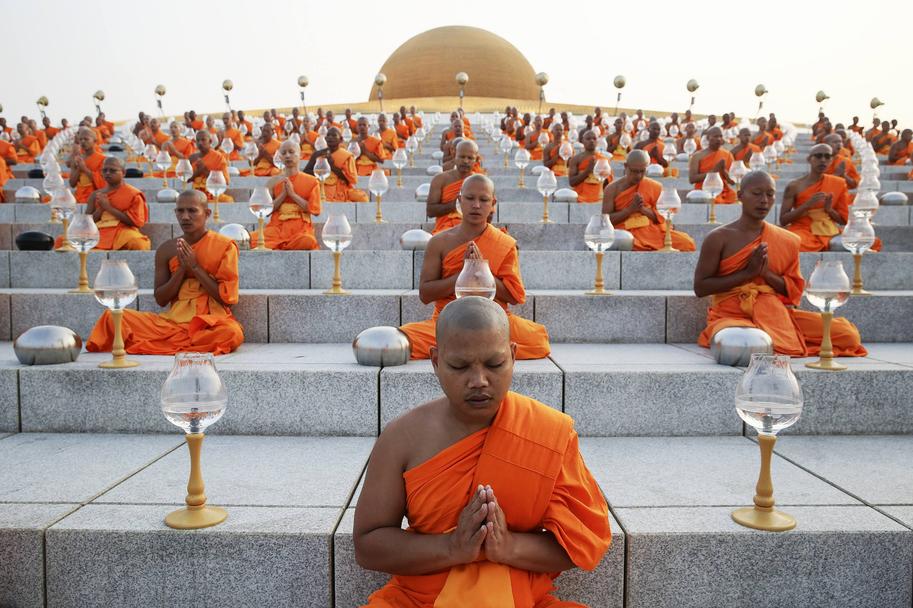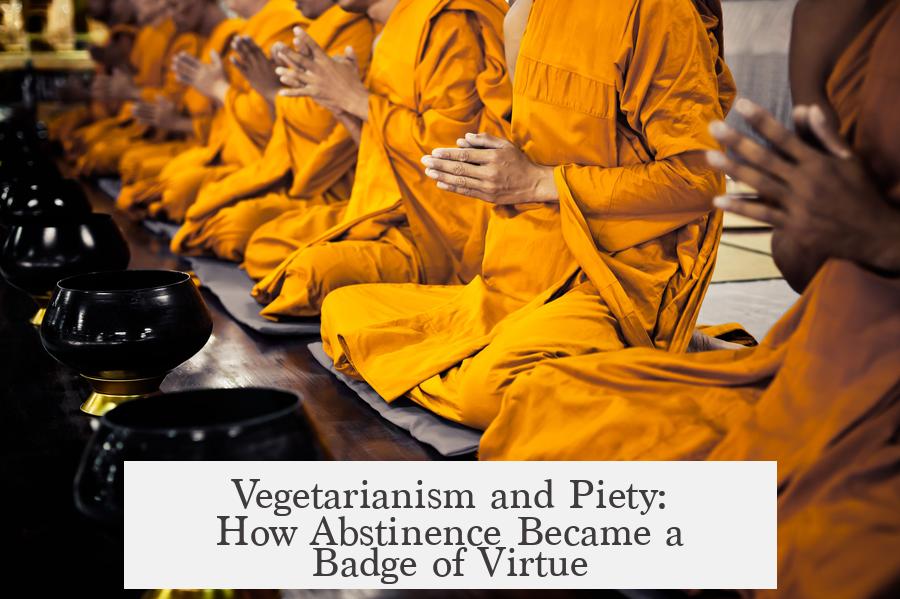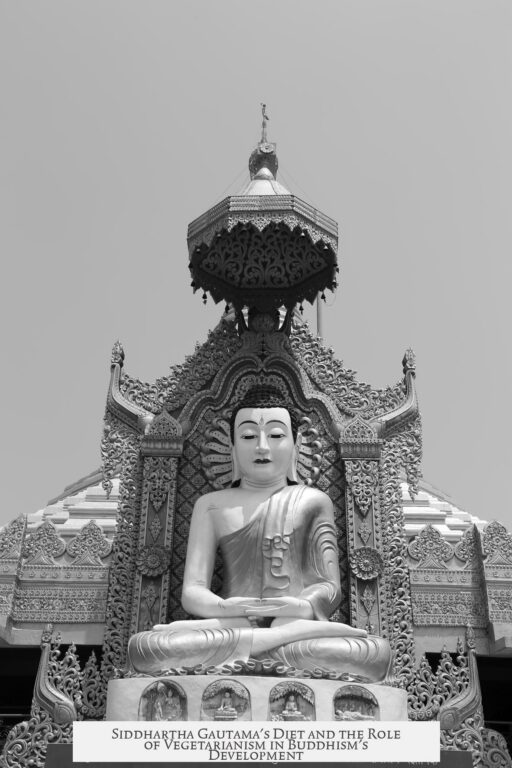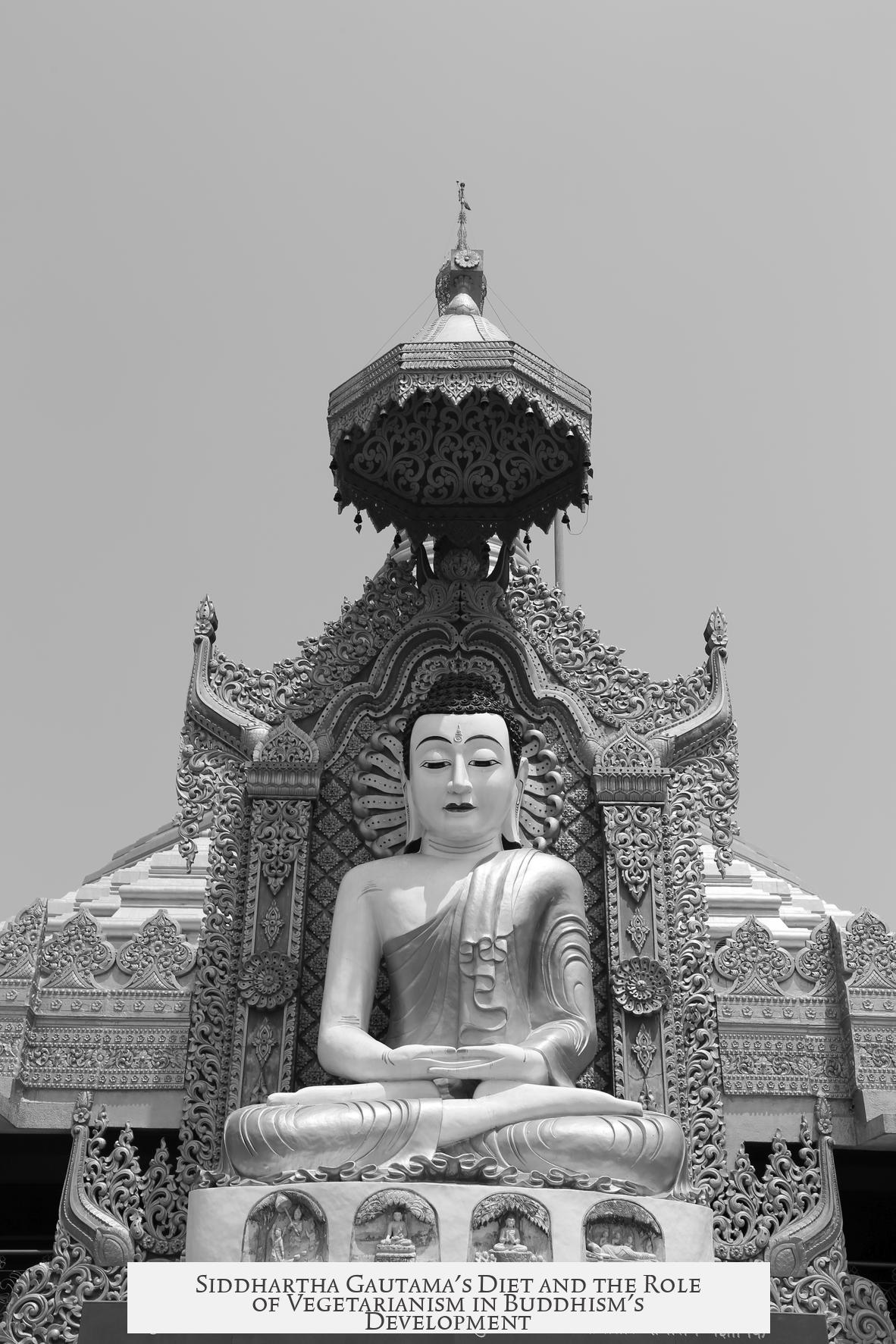Siddhartha Gautama likely was not a vegetarian, yet vegetarianism became an important part of Buddhism through later cultural, doctrinal, and historical developments. His diet included meals like sukara maddava, which may have been pork or mushrooms. Historical records and Buddhist texts do not establish a strict vegetarian practice by the Buddha. Indeed, tradition holds that monks should accept any food offered unless they know the animal was killed specifically for them. The Buddha’s teachings do not explicitly prohibit meat-eating but forbid killing living beings.
The Buddhist Vinaya Pitaka, especially as followed in Theravāda traditions like those in Thailand and Sri Lanka, requires monks to accept meat unless the animal was slaughtered on their behalf. This rule reflects the Buddha’s moderate stance advocating non-harm but allowing consumption of meat if it is incidentally part of alms food. When his cousin Devadatta attempted to impose vegetarianism on the monastic community to gain power, the Buddha rejected this, affirming that vegetarianism was not compulsory. Buddhist teachings emphasize not taking life rather than banning meat itself.
The rise of vegetarianism within certain Buddhist schools came much later and is linked largely to cultural and geographical shifts, especially in East Asia. When Buddhism spread to China, Japan, and Korea, local customs influenced monastic life. Confucian society discouraged almsgiving to monks, forcing monks to grow their own food. Monks, dedicated to vows of non-harm, avoided killing animals and thus adopted vegetarian diets. This practice aligned with broader Mahayana principles emphasizing compassion and nonviolence.
Several Mahayana sutras, including texts like the Lankavatara Sutra, explicitly criticize meat eating, framing it as contrary to compassion. The doctrine of reincarnation also influenced vegetarian views; consuming meat could mean eating beings who were one’s former family in past lives. The act of butchering conflicted with Buddhist nonviolence principles, deepening the association between righteousness and vegetarianism in some Mahayana communities.
- Almsgiving restrictions in East Asia influenced monks to farm and adopt vegetarian diets.
- Mahayana sutras articulated vegetarianism as an ethical requirement.
- Reincarnation doctrine reinforced abstinence from meat.
- Cultural shifts intertwined piety with fasting and dietary abstinence.
Over centuries, vegetarianism became a mark of monastic purity and piety in many Buddhist cultures. This conflation sometimes led to social pressure against meat consumption and performed abstinence as a sign of devotion. Such practices are less uniform in Buddhism globally; for example, the Dalai Lama, a prominent Mahayana teacher, does not always adhere to vegetarianism.
Regarding stories of the Buddha, many legends about Siddhartha Gautama are symbolic rather than strictly historical. These narratives serve pedagogical purposes, aiming to convey his teachings and principles rather than literal biography. The account of his last meal, although often debated (whether it was pork or mushrooms), lacks doctrinal dietary implications. It does not condemn meat nor prescribe vegetarianism.
Thus, vegetarianism’s importance in Buddhism arises from evolving interpretations, geographic and cultural contexts, and textual expansions after the Buddha’s lifetime, rather than from his explicit directives. It blends ethical concerns of non-harm, compassion, and social practice more than direct scriptural mandates by Siddhartha Gautama.
| Aspect | Details |
|---|---|
| Buddha’s Diet | Probably not vegetarian; accepted meat unless animal killed for him |
| Vinaya Rules | Monks must eat offered meat unless specifically killed for them |
| Vegetarianism Origin | Developed in Mahayana Buddhism, influenced by East Asian culture |
| Mahayana Sutras | Some texts condemn meat eating, emphasize compassion |
| Role of Stories | Serve teachings, symbolic rather than strict biography |
- Siddhartha Gautama did not originate vegetarianism in Buddhism.
- Buddhist doctrine forbids killing but allows eating meat if not killed specifically.
- Vegetarianism rose due to cultural influences in East Asia and Mahayana texts.
- Vegetarianism in Buddhism often reflects nonviolence and compassion ideals.
- Buddhist stories about the Buddha are pedagogical, not strict biographies.
Siddhartha Gautama wasn’t a vegetarian, how did vegetarians become such an important part of Buddhism?

Firstly, Siddhartha Gautama, the historical Buddha, most likely was not a vegetarian. Evidence suggests he ate meat during his lifetime, including a meal called Sukara Maddava, which scholars debate was either pork or mushrooms. Intriguingly, his death is believed to have involved eating spoiled meat, which adds to the complexity of his dietary habits.
This fact might surprise many who assume the Buddha always promoted vegetarianism. So how did vegetarianism become such a significant feature in some Buddhist traditions? The answer is a fascinating mix of cultural, doctrinal, and social influences that evolved over centuries.
The Buddha’s Eating Practices: More Nuance Than a Clearcut Rule
The available records, especially from the Vinaya Pitaka — the monastic code for Theravāda Buddhists (common in Thailand and Sri Lanka) — reveal some important truths. These texts do not forbid monks from eating meat outright. Instead, monks are instructed to accept any food offered to them, including meat, unless they know the animal was killed specifically for them.
Crucially, Buddhism places emphasis on compassion and non-harm, but it explicitly prohibits taking life. Eating meat is not banned; killing animals is. This distinction clarifies why the Buddha allowed meat consumption under certain ethical conditions.
In fact, when the Buddha’s own cousin, Devadatta, tried to push for vegetarianism within the monastic community – portraying the Buddha’s allowance of meat as indulgent – the Buddha firmly maintained his original stance. So, vegetarianism was not a requirement but a choice within early Buddhism, grounded on practical ethics rather than strict diet laws.
When Culture Meets Doctrine: The Rise of Vegetarianism in Mahayana Buddhism
The story takes an interesting turn when Buddhism spreads to East Asia. Here, Confucian values deeply influenced local cultures in China, Japan, and Korea. Confucianism discouraged almsgiving to monks, creating a food scarcity issue for Buddhist monastics. Consequently, monks began cultivating their own food, abstaining from killing animals to honor their vows. This necessity nudged them organically toward vegetarian diets.
Alongside this cultural blending, several Mahayana Buddhist texts explicitly condemn meat-eating. For instance, the Lankavatara Sutra — a later scripture — criticizes eating flesh, associating it with spiritual harm.
Some Mahayana Buddhists advance the argument that eating meat violates the principle of reincarnation: one could inadvertently consume the flesh of a former relative, such as one’s own mother. Whether one buys the literal truth of that is up to personal belief, but it does emphasize the compassionate ideal underpinning vegetarianism.
Furthermore, the butchery process itself conflicts with fundamental Buddhist values of nonviolence, nudging communities toward vegetarian lifestyles as a practical expression of compassion.
Vegetarianism and Piety: How Abstinence Became a Badge of Virtue

As time progressed, abstaining from meat became conflated with religious devotion and moral purity. Abstinence was viewed as a concrete way to demonstrate one’s commitment to non-harm and spiritual discipline.
However, this sometimes slid into performative piety or social pressure that labeled meat-eaters negatively. The association hardened into cultural norms that continue to influence Buddhist communities today, despite the lack of a strict historical or doctrinal basis for total vegetarianism across all branches.
Stories About the Buddha: Symbolism Over Biography
Stories about Siddhartha Gautama’s life, including his last meal, serve more as teaching tools than straightforward biographies. They are crafted to illustrate truths the Buddha represents, rather than precisely document historical facts.
Understanding that these stories are symbolic helps clarify why the meal he consumed isn’t flagged as a religious rule or dietary command. Although the meal’s specifics are recorded, the deeper Buddhist message revolves around compassion, mindfulness, and ethical conduct rather than strict dietary habits.
Why Does It Matter?
Knowing that Siddhartha Gautama wasn’t strictly vegetarian and that Buddhism doesn’t universally prohibit meat can clear up confusion and help practitioners adopt mindful eating habits based on personal ethics rather than misconceptions.
For example, those practicing Theravāda Buddhism might not see vegetarianism as mandatory but might choose it to align with compassion or environmental concerns. Meanwhile, some Mahayana Buddhists embrace vegetarianism more fully, influenced by historical, cultural, and scriptural factors.
It’s a reminder that Buddhism accommodates flexibility and encourages thoughtful choices rather than strict rules on diet. Moderation and nonviolence remain the essentials, not an inflexible menu of forbidden foods.
Takeaway Tips for Modern Buddhists and Curious Readers
- Don’t assume vegetarianism is a mandatory Buddhist practice. Learn the local and doctrinal context of the community you engage with before making judgments.
- Reflect on the principle of non-harm. Even if meat is consumed, consider how mindful you are about the source and impact of your food choices.
- Explore how culture influences religious practice. The rise of vegetarianism in Buddhism reveals how local customs and beliefs shape spiritual expression.
- Use the Buddha’s stories as guides, not literal historical accounts. Extract their ethical teachings rather than getting stuck on details like what he ate last.
- Be comfortable with complexity. Buddhism often embraces diversity – it’s not about perfect purity but continuous ethical reflection.
After all, if a man who changed the spiritual landscape of the world wasn’t glued to a strict vegetarian plate, maybe we all have room to practice compassion in a way that suits our time, place, and personal journey.
“Don’t kill, but eat what is given”—a simple but profound principle that still challenges us to reflect on how we live and consume in a complex world.
Did Siddhartha Gautama follow a vegetarian diet?
There is no clear evidence that Siddhartha Gautama was a vegetarian. He likely ate meat during his life. His final meal, Sukara Maddava, might have been pork or mushrooms, but this does not confirm strict vegetarianism.
Why does Buddhism not strictly forbid eating meat?
The Vinaya Pitaka states monks must accept meat unless the animal was killed specifically for them. Buddhism focuses on not taking life rather than banning meat. Moderation and non-harm guide dietary choices.
How did vegetarianism become important in some Buddhist traditions?
Mahayana Buddhism in China, Japan, and Korea adopted vegetarianism due to local cultural influences. Monks grew their own food and avoided killing animals, so vegetarianism arose. Later texts also discouraged meat eating explicitly.
Why do some Buddhist stories emphasize vegetarianism if the Buddha ate meat?
Buddhist stories are teaching tools, not exact biographies. Vegetarianism was linked to piety and nonviolence over time. Stories show principles, not just literal events, shaping how ideas spread in Buddhism.
Is vegetarianism practiced by all Buddhists today?
No, vegetarianism varies by tradition. Some sects like Theravāda monks eat meat if it’s offered. Others, especially in East Asia, emphasize vegetarianism. Personal and cultural factors influence practice.




